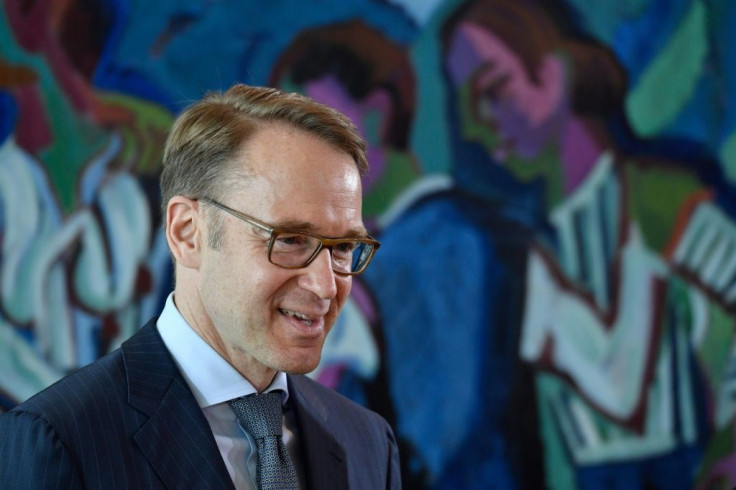German Central Bank Chief To Quit At Crunch Moment For ECB
German central bank president Jens Weidmann, a fierce opponent of loose monetary policies in Europe, will step down at the end of the year after a decade at the helm, the Bundesbank said Wednesday.
His departure comes as at a key moment for the future policy of the European Central Bank and on the eve of formal coalition talks that will likely determine the next German government.
Weidmann, a member of the ECB's 25-member governing council and head of the Bundesbank since May 2011, intends to step down on December 31 for "personal reasons", the German central bank said in a statement.
His term would have ended in April 2027 but the long-time president told colleagues in a letter that "after 10 years it is time to begin a new chapter".
The 53-year-old reached his decision earlier this year but kept it private until after elections in September to avoid influencing the result, a source close to Weidmann told AFP.
Weidmann prefered to step down before a new round of potentially tense discussions to decide the ECB's response to rising prices got going, the source added.
Appointed in the middle of the euro and Greek debt crises, Weidmann was unable to prevent Germany's influence on EU monetary policy from waning during his tenure.
As Weidmann steps down, the ECB is under pressure to respond to rising inflation in the eurozone and will shortly have to decide when to wind down its massive pandemic-era stimulus programme.
True to his hardline stance, the outgoing Bundesbank president warned in his letter that it would be "decisive" for the ECB's strategy "not to lose sight of future inflation risks".
Crisis response measures were only "appropriate" so long as the emergency they were designed to tackle continued, wrote Weidmann, who often clashed with ECB leadership over the bank's role.
Stability, he added, would only be achieved if "monetary policy observed its narrow mandate and does not let itself be led by fiscal policy or the markets".

A vocal proponent of tight monetary policy, Weidmann had become more of a "team player" at the ECB since the start of the coronavirus pandemic, said Frederik Ducrozet, a strategist at Pictet Wealth Management.
Weidmann thanked ECB President Christine Lagarde in his letter, noting the "sometimes difficult discussions" the pair had participated in over recent years.
In a statement, Lagarde said she respected Weidmann's decision, while regretting the loss of a "personal friend" and praising his "willingness to find compromise".
The early end of Weidmann's tenure could "tilt the debate within the ECB a bit more in a dovish direction", said Holger Schmieding, chief economist at Berenberg Bank.
The Bundesbank president's exit will also create a headache for the parties engaged in coalition talks to form the next German government.
A former economic adviser to Chancellor Angela Merkel, Weidmann became synonymous with the country's uncompromising stance against inflation.
Weidmann had "represented the Bundesbank brilliantly", Merkel's spokesman said, saying the choice of a successor would be left to the next German government.
Among the parties taking part in talks, the pro-business Free Democrats (FDP) have supported a more conservative direction for monetary policy than the Social Democrats and Greens.
The incumbent finance minister and likely next chancellor, Social Democrat Olaf Scholz thanked Weidmann for his "extraordinary efforts", saying the Bundesbank president had "marked monetary policy in Germany and Europe".
FDP leader and possible future finance minister Christian Lindner "regretted" Weidmann's resignation and said his party "advised continuity" at the top of the Bundesbank.
However Berenberg economist Schmieding said the next German government would likely appoint "a less hawkish successor".
© Copyright AFP {{Year}}. All rights reserved.





















